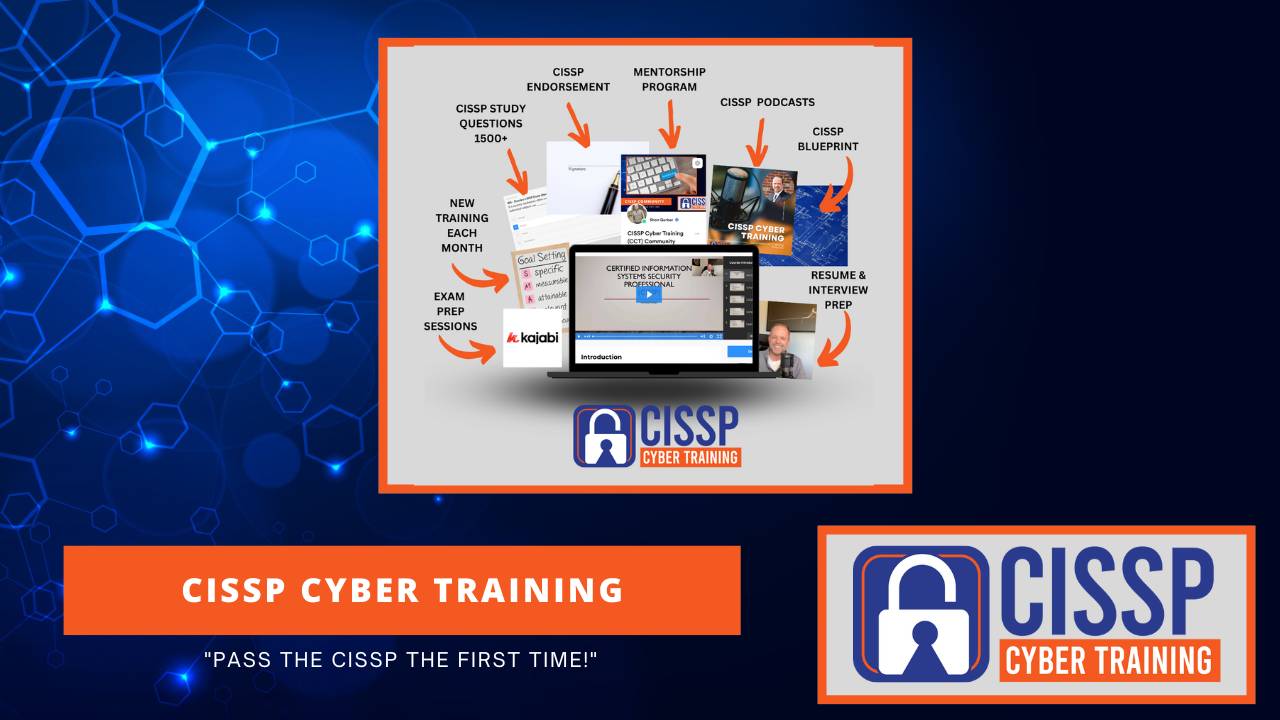CCT 175: Practice CISSP Questions - API Security, Gateways, and Risk Reduction Partnerships for the CISSP (Domain 8.5)
Sep 12, 2024Can API gateways really be the ultimate shield against cyber threats? Prepare to uncover the secrets of API security as we dissect CISSP Domain 8.5 in this episode of the CISSP Cyber Training Podcast. We'll walk you through practice questions that decode the most common API vulnerabilities and why denial of service isn't always the primary threat. Discover how an API gateway centralizes security and learn about essential authentication mechanisms like OAuth for secure token-based exchanges. We’ll also discuss best practices for securely managing API keys and the critical role of input validation in fending off SQL injection attacks.
Ever wondered how to forge strong alliances to combat cyber threats? Explore the extensive capabilities of Reduce Cyber Risk in our segment on Cyber Risk Reduction Partnerships. With our deep-rooted experience in IT, we detail how our tailored cybersecurity solutions, from penetration testing to insider risk training, can fortify your defenses. Learn how our strategic partnerships with IT professionals enhance our service offerings, providing customized security assistance and training. Tune in and elevate your cybersecurity game with actionable insights and expert advice.
Gain access to 60 FREE CISSP Practice Questions each and every month for the next 6 months by going to FreeCISSPQuestions.com and sign-up to join the team for Free. That is 360 FREE questions to help you study and pass the CISSP Certification. Join Today!
TRANSCRIPT
Speaker 1:
Welcome to the CISSP Cyber Training Podcast, where we provide you the training and tools you need to pass the CISSP exam the first time. Hi, my name is Sean Gerber and I'm your host for this action-packed, informative podcast. Join me each week as I provide the information you need to pass the CISSP exam and grow your cybersecurity knowledge. All right, let's get started. Let's go. Cybersecurity knowledge.
Speaker 2:
All right, let's get started. Hey, I'm Sean Gerber with CISSP Cyber Training, and hope you all are having a beautifully blessed day today. Hope you're having a wonderful week and that you're just getting started and that you had a wonderful weekend. I was talking to some friends out of Chicago and they had the Taste of Chicago this weekend. I think that sounds like a lot of fun. So if you're in the Chicago area, I'm sure you all had a chance to go, maybe do that. But that was talking to the gentleman I was visiting with. It sounded like a great, great opportunity.
Speaker 2:
We are just got back from the Ozarks so just the small little area about four hours from Wichita Very nice, very beautiful, and my wife and I were going down there just to kind of check things out and see if it's a place we want to be in the future. But you are not here to hear about the Ozarks or about Taste of Life in or Taste of Chicago in Chicago. You are here for CISSP questions. So today we're going to be getting over domain 8.5. This is a follow-on to what came out on Monday the podcast for Monday and that was over 8.5 itself. So we are going to get into these specific questions.
Speaker 2:
If you're not familiar these questions, there's 15 questions. These are not going to be one-for-one questions that you will see on the CISSP. I can pretty much guarantee you that they will be representations potentially, ie air quotes potentially, of some of the questions you may encounter. But at the end of the day, the questions that we're giving you are not designed to be the one for one, to kind of help you memorize it and then move on. The goal is to understand the actual question and then what is the context of the data that's there, so that when you see the question or similar type question on the CISSP, you kind of have an understanding of how to answer that overall question. So let us get started. Enough of the monologue. So question one which of the following is not a common API attack? Now, this is a tricky one. Which one?
Speaker 2:
is not a common type of API attack? A SQL injection, b cross-site scripting, c API key theft or D denial of service. Now, all of those can affect APIs, but the one that's not a common type of API attack is the denial of service. That is D. Okay, so D the denial of service attacks can affect APIs specifically around one specific API, or it could be multiple APIs, but it is not generally a attack that is targeting specific APIs.
Speaker 2:
Question two which is the primary purpose of an API gateway? Which is the primary purpose of an API gateway? Which is the primary purpose of an API gateway? A to protect the APIs from unauthorized access. B to act as a reverse proxy for APIs. C to centralize API management and security. Or. D to provide API documentation. So well, the primary purpose again, air quotes. Primary purpose of an API gateway. So well, the primary purpose again, air quotes. Primary purpose of an API gateway is C to centralize API management and the overall security and analytics that go with it. So it does help protect APIs from, potentially from unauthorized access and it does help with in some situations like a reverse proxy for APIs. But At the end of the day, the primary purpose of the gateway is to provide centralized management and to protect the APIs from a security point of view, so that you have a single entry point for your API request. It does provide features such as rate limiting authentication and security policy enforcement.
Speaker 2:
Question three which authentication mechanism is commonly used for APIs and involves the exchange of tokens? Again, which authentication mechanism is commonly used for APIs and involves the exchange of tokens? A basic authentication. B digest authentication. C OAuth or D Kerberos? C OAuth or D Kerberos? Again, which authentication mechanism is commonly used for APIs and involves the exchange of tokens? We talked about the exchange of tokens and what occurs with that, and that is OAuth. Right, oauth is a popular authentication protocol that uses tokens to grant access to apis. Right, we talk about how the importance of that is because it's much more flexible than having a static api key and it's designed to provide delegation of the authorization, allowing users to grant third-party applications access and so forth. So it's great capability, all right. Question four which of the following is the best practice for storing API keys? A in plain text, with applications configuration files yeah, no, that's not a good idea. B insecure key management system. C as an environmental variables no, and D in a database? Yeah, you can do that.
Speaker 2:
But so what is the best practice for storing API keys? I kind of alluded to it and it is B secure key management system. Obviously, a secure key management system is the best place to store these, because that system can encrypt and manage the keys, ensuring they are protected from unauthorized access. Question five which of the following is a security best practice for API design? Which of the following is a security best practice for API design? A overly permissive access controls, B lack of error handling, c input validation or D excessive logging? Okay, which is the following security best practice for api design? And the answer is c input validation. Right, so input validation is a crucial securities practice for apis and for pretty much any web form, and it does involve validating and sanitizing user inputs to prevent SQL injection attacks. Now, depending on how you have your API set up, if you do have some sort of connectivity where a user's adding in sort of credentials, input validation is important. If your API connection is really just kind of connection to you know server to server type connections, then obviously the input validation may not be the most important thing that you want to consider. Question six which of the following is a common API security threat? A API abuse. B API key theft, c API injection attacks or D all of the above, which is a common API security threat? And the answer obviously is D, because abuse, theft and injection attacks are all common API security threats. So it is all of the above. So each of those can be exploited by attackers.
Speaker 2:
Question seven what is the purpose of an API rate limiting and what is the purpose of API rate limiting? A to prevent excessive API usage and mitigate potential DDoS attacks. C to improve API performance. C to track API usage and analytics. Or D to enforce API authentication. So what is the purpose of an API rate limiting? And it is A to prevent excessive API usage and mitigate DDoS attacks.
Speaker 2:
Question A which of the following is a security challenge associated with API versioning? Which of the following is a security challenge associated with API versioning? A difficult to manage API changes. B increased complexity. C potentiality for compatibility issues or D all of the above. Which of the following is a security challenge associated with API versioning? And the answer is D all of the above right. All of the above are issues that are dealing with API versioning, such as managing API changes. Increased complexity and potential compatibility issues are all factors that need to be considered when implementing API versioning. What that basically means is what APIs are you communicating with? Another API based on a specific version Adds a lot of complexity. A lot of complexity. Can be very, very secure, depending upon the situation, but it does add a lot of complexity.
Speaker 2:
What is the primary goal of API testing? A to identify vulnerabilities in APIs. B to improve API performance. C to ensure API compliance. Or D to test API functionality. So what is the primary goal of API security testing? And the answer is A to identify vulnerabilities in APIs. The primary goal of API testing is to find these vulnerabilities right. So these can include SQL injections, cross-site scripting or even the API key theft. But it's important that you do understand the overall testing strategy around your APIs and not just go ahead and have someone who can create APIs and then throw them into production.
Speaker 2:
Which of the following is a security best practice for API documentation? A include sensitive information about API implementation. B make documentation publicly available. C clearly define access controls and permissions. Or D avoid using versioning in the documentation. So which of the following is a security best practice for API documentation? And it would be C Clearly define the access controls and the specific permissions. That's what needs to be called out in the documentation. If you want people to use it, they need to understand what are the access controls and permissions associated with it, and you need to define those in the documentation you have.
Speaker 2:
Question 11, what is the role of an API gateway in API security? Okay, so what is the role of a API gateway in API security? So we talked about role, we talked about best practice, so now we're going to get into what is the role of API gateways. It enforces security policies and controls. True, it provides API documentation. Yes, it does in the readme type areas, right? So you'll see some of the documentation in the API and how to connect and so forth. C handles API requests and responses, obviously, and then D all of the above, and the answer is D, of course, right, it's got handles everything in there. It's a crucial role of this and it does have all of that, all of that capability, built into it. Now, it's a role of the API gateway. It's not the best practice when dealing with the gateway.
Speaker 2:
Question 12, which of the following is a common API security threat related to API keys? Okay, so which is a common API security threat related to API keys? A API key theft, b API injection attacks. C API abuse or D all of the above. Which is a common API security threat related to API keys? And the answer is A API key theft. It's a common security threat related to the keys, and they may attempt to steal the keys to gain unauthorized access to the specific APIs, especially if your keys are hard-coded, right? That's not a good idea.
Speaker 2:
Question 13, which of the following is a security best practice for API design?
Speaker 2:
Which of the following is a security best practice for API design?
Speaker 2:
A use strong encryption for API traffic. B avoid using versioning for APIs. C overly permissive access controls or D lack of error handling. So which of the following is a security best practice for design? And the answer is A right. So what ended up? Having all the positives? And then there was three negatives. So obviously you found out real quick, going well, based on the question, it would be A and you were right. Using strong encryption is an important factor when dealing with API traffic. It does help protect sensitive data, especially if you're dealing with sensitive information, right? So APIs in many cases aren't necessarily encrypted, depending on the data that's being transmitted. But if you are collecting and transmitting sensitive data such as PHI or something that's maybe financial aspects you would probably yes, most likely want encryption enabled. Financial aspects you would probably yes, most likely want encryption enabled.
Speaker 2:
What is the purpose? Question 14, what is the purpose of API logging? A to track API usage and identify anomalies. B to improve API performance. C to provide API documentation or D to enforce API security policies. So what is the purpose of API logging? Well, some of those it does help right. So, as far as performance, it can help improve it. It also can help enforce the API security policies based on the logs that you're able to pull. But in reality, a is to be able to track API usage and identify any potential anomalies is what the real main purpose of API logging is. So it'll help you determine if there's some threats or something that may need to be addressed specifically. Question 15. Which of the following is a security challenge associated with API integration? So again, what is a security challenge associated with API integration? A compatible data formats.
Speaker 2:
B lack of standardization. C security vulnerabilities in third-party APIs. Or D all of the above. So which of the following is a security challenge associated with API integration? And the answer is D all of the above. Again, incompatible data formats, lack of standardization and security vulnerabilities in third-party APIs are security challenges that face API integration. Okay, that is all I have for you today.
Speaker 2:
Head on over to CISSP Cyber Trading. You can get access to all these CISSP questions. They're there in video format. They're also available in test format. You can go take tests. But again, you can go and sent check out what are some of the products I have available for you at CISSP cyber training. If you want mentorship, I've got that. If you want to just study for the test, I've got that. If you want to have both, I've got that too. So all of that is available to you. Also, keep it in mind that all sales that go through cissp cyber training are all tied to our non-profit for adoptive families. Again, that's what the whole purpose of it is.
Speaker 2:
Around. That also go to reduce cyber riskcom. I've actually got some partnerships with some other it professionals and from pen testing to insider risk training, to you name it I can cover it. At Reduce Cyber Risk. We are there to kind of provide you a overall carte blanche kind of capability in the reduced or in the cyber space and, using my years of background and understanding both enterprises as well as small and medium-sized businesses, I'm going to bring the right people to bear to help you with your organization. Because, again, I know a lot of people that listen to this podcast are IT professionals that have been around for a while and you probably are looking for some security assistance as you're trying to transition into that potential role yourself. Look to ReduceCyberRiskcom to help you out in that space. Again, reducecyberrisk or CISSPCyberTrainingcom you can get you the security training you need and the security assistance you need to be successful and to protect you from the evil hacker horde. All right, have a wonderful day and we will catch you all on the flip side, see ya.
CISSP Cyber Training Academy Program!
Are you an ambitious Cybersecurity or IT professional who wants to take your career to a whole new level by achieving the CISSP Certification?
Let CISSP Cyber Training help you pass the CISSP Test the first time!





